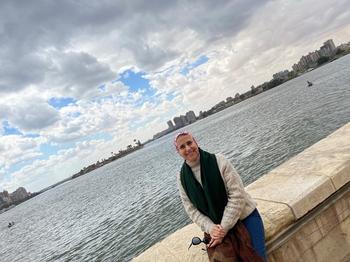Dina M. Oleimy (The British University in Egypt)
Early Career Fellow in Research Area 4: "Literary Currencies"
February–August 2023
Digital Authorship in Elwarka's Temporal Community
It is hard to deny that, as alternative locales that welcome a massive flow of cultural practices, the presence of digital forums/platforms constitutes a real challenge to the canonical image of authorship that not only asserts the power of the author, but also provides them with a sense of cachet among their audience and other authors. The aim of this project is to investigate how digital cultural practices re-work the notion of authorship. Elwarka (The Page) is considered a good example of how the notion of authorship has been re-considered. The opportunities that digital platforms, Elwarka's Facebook page as example, offer webcomic readers pinpoint the idea that the author’s messages are always subject to ongoing processes of re-readings by the audience, who are given the chance to propose their understanding of the work produced.
The framework of this project is both analytical and methodological. The analytical framework presents a thorough reading of concepts like authorship and temporality to emphasize how digital temporal communities drastically change and revisit the notion of the subjective author through the new concept of the collective author, which turns digitally produced work into user-generated content. For the methodological framework, the project explores the correlation between the reworked notion of authorship within the temporal experience that is lived by both the webcartoonist and their readers. In this regard, the project presents an analysis of webcomic samples to emphasize how the traditional concept of authorship has been reworked through the new vision of the collective author — and how this opens the sphere for webcomic readers to become authors too. The analysis of selected webcomics also shows how Gawish’s presence is not only limited to being the creator and author of the webcomic; it also extends to a post-production stage in which his authorship is asserted through the different interaction patterns he creates when responding to his readers.
Dina Oleimy is a postdoctoral scholar and lecturer at the British University in Egypt (BUE). Her main research interests revolve around digital cultural practices, especially webcomics, and how these practices use humour as a tool that leads to creating alternative discourses that challenge and question official ones. During her study of webcomics, Oleimy presents a model that helps to analyse how humorous messages are formulated visually and verbally. Besides publishing her dissertation as a book in 2015, she (with Nohayer Lotfy) published a paper titled "Humour as Resistance in the Egyptian Stand-Up Comedy after the January 25th Revolution" in 2014 and "Facebook and the Neo-Nomads: A Study of the Work of the Egyptian Comic Artist Muhammad Wahba El-Shennawy and the Use of Comics in History-Telling" in 2019. Oleimy was also a junior researcher in a four-year-research project (2018-2021) funded by Leibniz-Zentrum Moderner Orient (ZMO). During this project she participated in several workshops and published an article in 3al-Janib (On the Side) magazine, which collated all the topics discussed over the course of the project.
